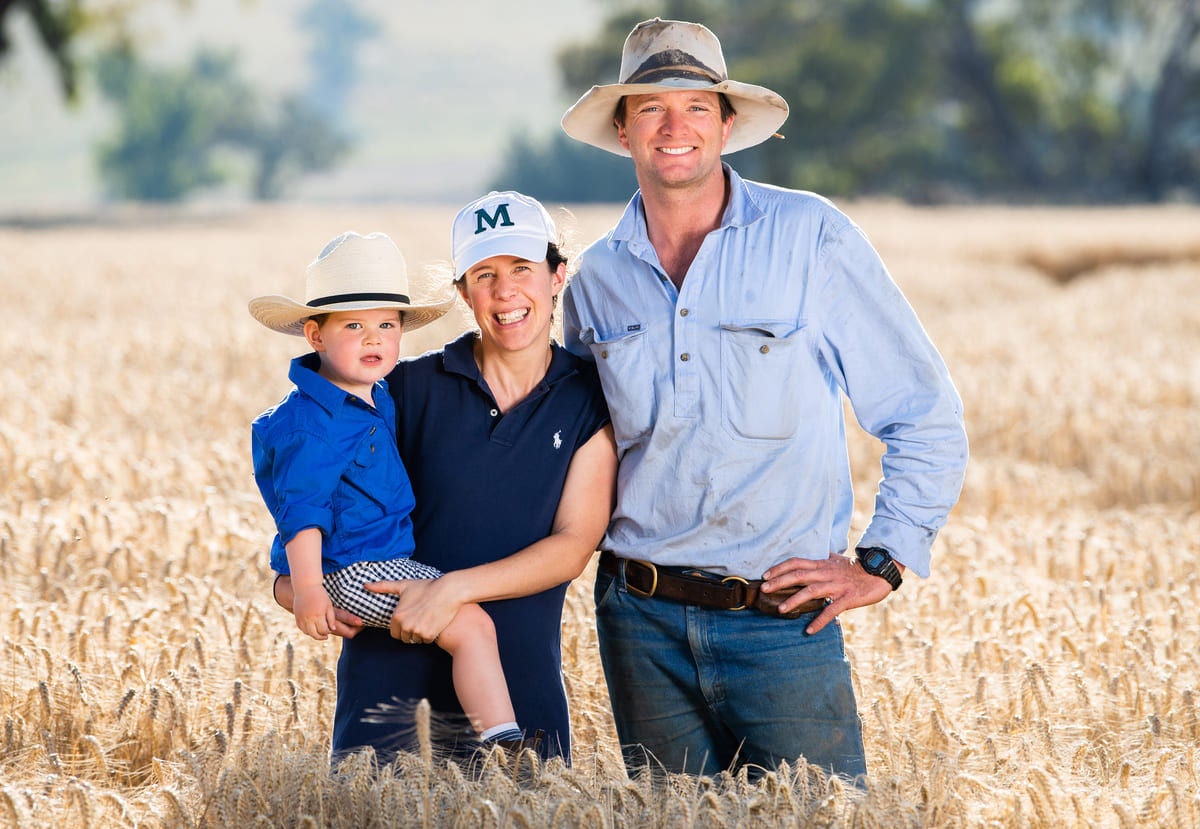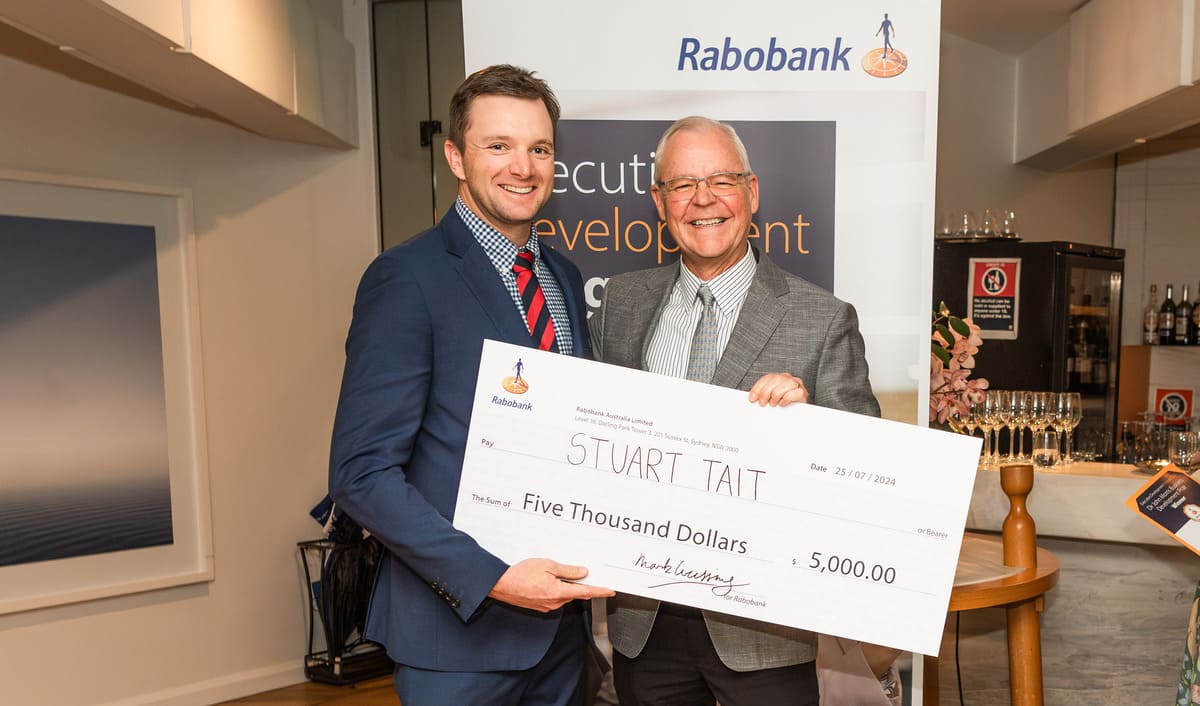07/08/2024
New South Wales mixed farmer Stuart Tait has taken out the 2024 Rabobank Business Management Prize from a field of some of Australia’s and New Zealand’s leading farmers.
An “impressive business plan that was truly entrepreneurial in comprehensively strategising the expansion opportunities” for his family’s farming enterprise, based near Mandurama on the NSW Central Tablelands, has earned this progressive young producer this year’s Rabobank ‘Dr John Morris’ Business Development Prize – a prestigious trans-Tasman business prize awarded annually as part of the Rabobank Executive Development Program (EDP).
The plan – which Mr Tait developed as a management project while undertaking the EDP – explores business expansion opportunities via the on-farm development of the small-scale modular production of nitrogenous fertiliser.
The Rabobank Executive Development Program is a course developed for farmers looking to build strategic planning capabilities and commercial management skills to explore options for business growth, run as two modules over an 11-month period. The program covers topics including formulating and implementing long-term strategies, business planning including understanding market conditions and using sound business logic for goal setting and decision making, as well as developing leadership skills to run growing enterprises – all while developing a strong network of progressive farmers.

New South Wales mixed farmer Stuart Tait and family
Following the completion of the first module of the EDP in 2023, Mr Tait undertook a review of the production and financial performance of his business, Tait Agriculture, to determine areas for improvement, as well as exploring potential expansion opportunities.
Blue sky thinking
Mr Tait said the review of his beef cattle breeding and trading, and dryland winter cropping, business prompted him to examine internal productivity levels and expansion possibilities.
“The business is keen to continue to expand its farming operations within a 50 kilometre radius of Mandurama,” he said, “however despite improvements to productivity, profitability remained challenging, primarily due to the high asset value of local farmland.
“Given that expansion through property purchase was not seen as a viable option, the door was opened to blue sky thinking for business growth.”
Mr Tait said on-farm fertiliser production was identified as an expansion opportunity within his farm’s existing footprint.
“Small-scale modular production of nitrogenous fertiliser on-farm presented a growth opportunity for the business and also addressed a number of critical industry issues – fertiliser market volatility, CO2 emissions and utilising residue straw/crop,” he said.
“Due to reduced domestic supply of fertiliser and an increased reliance on global supply chains, the supply and price of fertiliser has become increasingly volatile, placing additional strain on farming businesses to procure product at suitable prices.
“And utilising straw/crop residues presents both a number of benefits and challenges to broadacre farming systems. Whilst providing soil health benefits in terms of moisture retention and minimising erosion, stubble also acts as a host for a range of pests, as well as being a physical impediment for the establishment of the following crop. The breakdown and oxidisation of straw, either through deliberate burning or in retained stubble systems, is a significant source of carbon emissions on farm.”
Mr Tait said the concept of on-farm modular fertiliser production potentially addresses these issues, by using the waste straw, removing it as a physical impediment and source of emissions, and using it to produce a carbon neutral fertiliser with a manageable supply chain.
The next horizon
Tait Agriculture has recently entered into a partnership with HydGene Renewables – an Australian hydrogen technology startup, working on engineering solutions to transform biomass into products – to commence a field-pilot program from next year.
“We are working towards completing a techno-economic feasibility study by September this year,” Mr Tait said. “And will undertake pilot programs through 2025 and into 2026.

Stuart Tait with Mark Wiessing
“The ultimate goal is to develop a modular, localised urea-manufacturing process from waste straw.”
Mr Tait said he was seeking government grants to assist in covering the capital costs of the pilot programs.
Key learnings
Mr Tait, a former Nuffield scholar, first learnt about the Rabobank EDP via the long-term Nuffield/Rabobank partnership.
“Nuffield offer a number of ‘post-grad’ learning opportunities to former scholars – Rabobank’s EDP is one of those opportunities,” he said. “The program content has been the perfect fit for me – providing the tools and knowledge I was looking for at this point in my career.
“The sessions on strategic implementation were particularly valuable. Learning how to implement a business strategy on the ground and stopping to plan has been incredibly useful.
“Another highlight was the opportunity to learn and network with a group of outstanding farmers.”
Impressive on several levels
With seven EDP participants presenting their business plans for the Rabobank ‘Dr John Morris’ Business Development Prize’, program director Robin Stonecash said Mr Tait’s project showed he applied the tools and frameworks from the EDP to rethink the business and set himself up for success.
“Stuart’s project went well beyond the usual growth plans for farm expansion. He used the concepts of long-term planning and blue sky thinking to solve a problem common to most farm businesses,” she said.
Dr Stonecash said Mr Tait developed a strong business case, spoke about what would enable the project to succeed and what potential roadblocks might be, all with an eye on the environmental benefits of the scheme. “It truly is an outstanding example of how farmers can be innovators as well as strong farm operators. I look forward to watching his business develop,” she said.
James Greenacre from Rosemount Agriculture near Cressy in Northern Tasmania was announced People’s Choice Winner thanks to his successful strategy to increase profitability within his 1300-head dairy business through benchmarking, technical production efficiencies and investing in systemising the business. Mr Greenacre’s project was also recognised with a Highly Commended award from the judges.
Now in its twenty fifth year, more than 850 Australian and New Zealand farmers have graduated from the program.
Rabobank Australia & New Zealand Group is a part of the international Rabobank Group, the world’s leading specialist in food and agribusiness banking. Rabobank has more than 125 years’ experience providing customised banking and finance solutions to businesses involved in all aspects of food and agribusiness. Rabobank is structured as a cooperative and operates in 37 countries, servicing the needs of approximately 8.4 million clients worldwide through a network of more than 1000 offices and branches. Rabobank Australia & New Zealand Group is one of Australasia’s leading agricultural lenders and a significant provider of business and corporate banking and financial services to the region’s food and agribusiness sector. The bank has 90 branches throughout Australia and New Zealand.
Media Contacts:
Denise Shaw
Head of Media Relations
Rabobank Australia & New Zealand
Phone: 02 8115 2744 or 0439 603 525
Email: denise.shaw@rabobank.com
Will Banks
Media Relations Manager
Rabobank Australia
Phone: 0418 216 103
Email: will.banks@rabobank.com
